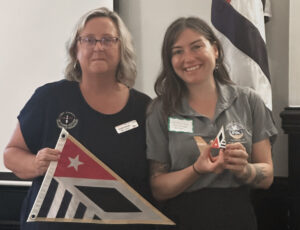News
ACTION ALERT: NCDEQ permits need OUR input!
ACTION ALERT, Action Alerts, CAFOs, Climate Change, Environmental, Neuse River Watershed, Sound Rivers, Tar-Pamlico Watershed, Water Quality
Posted on October 26th, 2023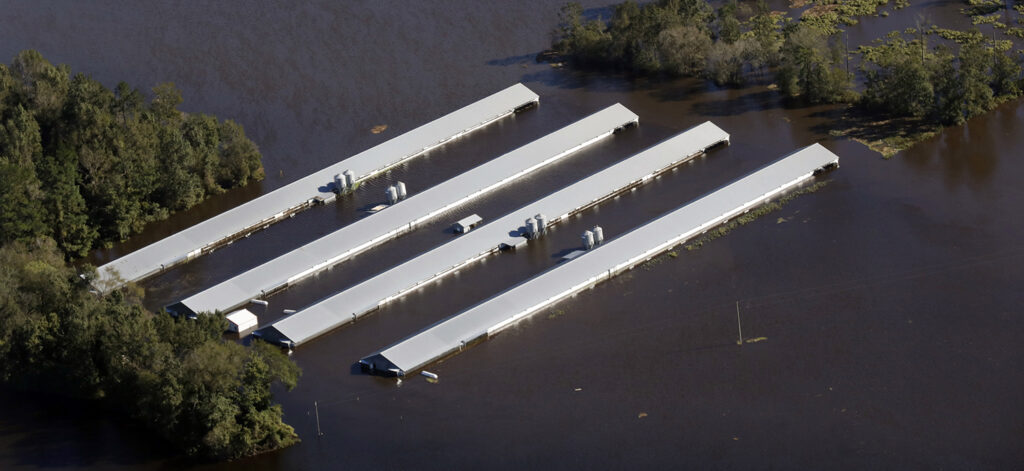
An industrial animal feeding operation is consumed by floodwater from the Neuse River during Hurricane Matthew.
WRITE YOUR COMMENTS TO NCDEQ HERE!
Currently, the North Carolina Department of Environmental Quality has six General Permits up for renewal, all having to do with how animal waste is managed in North Carolina. They are all open for public comment.
Our focus here is on the Swine General Permit and the Swine Biogas Permit. General permits are used by the state to address the majority of the animal operations that are subject to the requirements of the Clean Water Act in North Carolina. General permits are written to regulate categories of facilities that may be similar. However, DEQ has the ability to require an individual permit of any facility if the general permit does not protect waters or public health. The Swine General Permit and the Swine Biogas Permit do not address systemic issues and fail to incorporate sufficient regulations to confidently prevent waste from leaking from, spilling into and running off concentrated animal feeding operations (CAFOs) into our waterways.
The outdated lagoon and sprayfield system — in which hog waste is stored in massive lagoons, then the waste is piped to spray on fields — perpetuates ongoing, disproportionate harm to communities of color and low-wealth rural communities. Waste stored in open-air pits and sprayed on nearby fields gets into people’s homes and pollutes both air and water. The negative impacts to health, including illness and death, of those living near CAFOs have been well documented.
These permits need to do better by those impacted communities.
While the draft swine permit does require groundwater monitoring for facilities in the 100-year floodplain, CAFOS with waste-storage systems in the floodplain or floodway are only a tropical storm away from a major spill. Ideally, these facilities would not be eligible for a general permit, but, at the very least, these flood-prone CAFOs should be required to take additional precautions to prevent waste from entering our waterways and more monitoring to ensure it is not.
Another major concern with these permits is that facilities that have historically failed to meet environmental standards and been cited for improper waste disposal, improper maintenance, and/or have experienced spills, are eligible for General Permit coverage. General Permit coverage should be reserved for only those with a track record of demonstrating adherence to environmental standards. Those with citations should be required to get an individual permit that takes into account the local environment and potential impact to neighbors’ health and includes better controls to avoid pollution and poor water quality.
“If you’re a bad actor, you shouldn’t be eligible for these general permits,” said Neuse Riverkeeper Samantha Krop.
NCDEQ needs to know that by perpetuating outdated systems and the harm they cause to low-income communities and communities of color, as well as allowing facilities previously cited for polluting to continue operation under a General Permit, the new permits only entrench a flawed system polluting our waterways and harming our communities. We can do better.
Related News
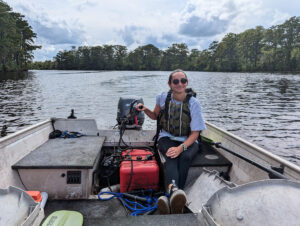
Riverkeeper monitoring Tar-Pamlico Water Trail
July 25th 2024

Rain ramps up trash-trap cleanouts
July 25th 2024

Riverkeeper, intern take on emergency trash trap cleanout
July 25th 2024

Tar-Pam Riverkeeper investigates Cub Creek turbidity
July 25th 2024
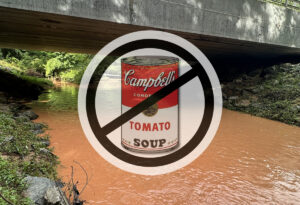
Heavy rains lead to sky-high turbidity on Lick Creek
July 25th 2024
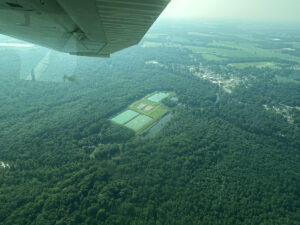
Riverkeeper: What goes up, must come down
July 18th 2024
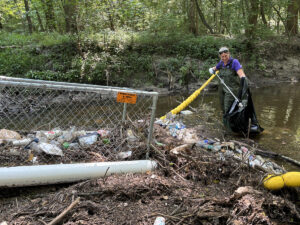
Greenville’s trash trap gets emergency cleanout
July 18th 2024

Sound Rivers gets close up of cyanobacteria
July 18th 2024
